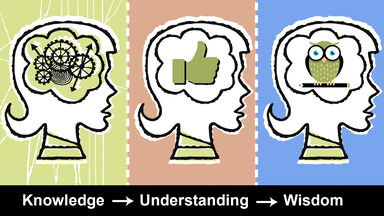
Wisdom, Knowledge, and Understanding: What is the Difference?
The fear of the Lord is the beginning of wisdom: and the knowledge of the holy is prudence/understanding/insight. (Proverbs 9:10-12)
I posted a quote the other day that someone questioned. As I thought back over it. I realized that the quote was not quite correct. Here is the quote:
“If the fear of the Lord is the beginning of knowledge, why would we ask those who do not fear the Lord to teach our children?”
I can only assume that the person who said this was referring to Proverbs 9:10-12. If that is true, then they misunderstood what the verses said.
It does not say, the fear of the Lord is the beginning of knowledge. What it does say is that “the fear of the Lord is the beginning of WISDOM. (Douay-Rheims) So what is the difference between wisdom and knowledge. For that matter the same scripture mentions the word “understanding”. So we could ask the question, what is the difference between understanding, knowledge, and wisdom? And what does it mean to fear the Lord?
The Fear of the Lord
Awareness of God’s presence and coming judgment
If we knew that all of our secret thoughts, words, and actions would be displayed publicly so that everyone could watch them and evaluate them, it would make a profound difference in the way we live! We have an instinctive concern about what others think of us and how they will judge the things we do.
If we have this much concern over what other men and women think of us and our actions, how much more should we be concerned about God’s evaluation of our thoughts, words, actions, attitudes, and motives?
The Assurance That God Is Watching
Each of us will give an account of our lives to God, and He is fully aware of everything we think, desire, speak, and do. The fear of the Lord is an awareness of these truths. It can be defined as a continual awareness that you are in the presence of a holy, just, and almighty God, and that every motive, thought, word, and action is open before Him and will be judged by Him.
Also check page out: Learning to Fear the Lord
Knowledge, Understanding, and Wisdom
- Wisdom, knowledge and understanding, are recurring themes in the Scriptures, and are related but not necessarily synonymous.They are spoken of as separate and distinct. Thus, it may be useful to attempt to define the differences of meaning
- Knowledge is the facts. Understanding is the ability to lift the meaning out of the facts, and Wisdom is knowing what to do next. Since God rarely gives all three gifts to any person, we need to cooperate and assist each other with our particular gift--in this, as in every area.
|
Knowledge |
Understanding |
Wisdom |
|---|---|---|
|
Facts |
Meaning |
What to Do |
|
Information |
Principles |
Application |
|
Memory |
Reason |
Action |
|
Scholars |
Teachers |
Prophets |
- Those with knowledge are able to collect, remember, and access information. They "know" the Scriptures. God's word is literally "in them". They are scholars. But, it is possible to have knowledge and lack understanding and wisdom; to have the facts, but have no clue as to the meaning or what to do next.
- Those with understanding are able to abstract the meaning out of information. They "see through" the facts to the dynamics of what, how, and why. They are teachers. Understanding is a lens which brings the facts into crisp focus. Understanding produces "rules of thumb" or principles
- Those with wisdom know which principle to apply now. Understanding without wisdom can appear contradictory (Prov 26:4-5). For example, "He who hesitates is lost", is a valid principle as well as: "Haste makes waste". We see the truth of both. But which should we apply next? Those with wisdom know what to do next; they know which way to go. They do the right thing. In contrast, there are many who have great knowledge and understanding, but consistently do the wrong thing. Wisdom, in this sense, is the goal, and knowledge and understanding only have eternal value as they result in wisdom, or what we end up doing.
James 1:5 But if any of you lack wisdom, let him ask of God, who giveth to all men abundantly, and upbraideth not; and it shall be given him.
- God promises wisdom to those who ask. Knowledge and understanding may be beyond us. Most often, when we pray for wisdom, God calls us into fellowship with other believers who can provide an answer, but whom we may not like. God has given generously, but we will not submit ourselves to the Christ Church to receive it
- The above definitions give the words a "special meaning". More often than not, the words are used in English as synonyms; but not always with Scripture. By attaching "special meaning" to the words, it is hoped that real differences in function can be made clear.
For St.Thomas Aquinas Definitions in his Summa Theologiae go to:The Seven Gifts of the Holy Spirit
Also Check out: Confirmation-The Seven Fold Grace of God pt 1: Wisdom, Knowledge, Understanding





 Follow
Follow


